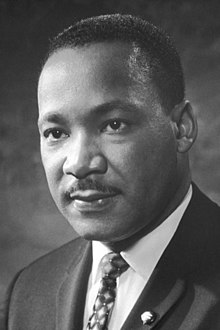Intelligence plus character - that is the goal of true education.
--Martin Luther King, Jr. (1929 – 1968)
(195:10.17) Even secular education could help in this great spiritual renaissance if it would pay more attention to the work of teaching youth how to engage in life planning and character progression. The purpose of all education should be to foster and further the supreme purpose of life, the development of a majestic and well-balanced personality.

To be great, you have to be willing to be mocked, hated, and misunderstood. Stay strong
--MLK
(154:6.9) It is forever true that all who may think they are misunderstood or not appreciated have in Jesus a sympathizing friend and an understanding counselor.
(171:4.2) And so will they mock the Son of Man, even spit upon him and scourge him, and they will deliver him up to death. And when they kill the Son of Man, be not dismayed, for I declare that on the third day he shall rise. Take heed to yourselves and remember that I have forewarned you."
(140:9.3) Some of you will be put to death, and before you establish the kingdom on earth, you will be hated by many peoples because of this gospel; but fear not; I will be with you, and my spirit shall go before you into all the world.
(176:1.1) For a time you may be hated by all men for my sake, but even in these persecutions I will not forsake you; my spirit will not desert you.

If I cannot do great things, I can do small things in a great way.
--MLK
(171:7.10) And it behooves the Master's followers in all ages to learn to minister as "they pass by"—to do unselfish good as they go about their daily duties.
Martin Luther King Jr. was an American Baptist minister, activist, and political philosopher who was one of the most prominent leaders in the civil rights movement from 1955 until his assassination in 1968. A Black church leader and a son of early civil rights activist and minister Martin Luther King Sr., King advanced civil rights for people of color in the United States through the use of nonviolent resistance and nonviolent civil disobedience against Jim Crow laws and other forms of discrimination in the United States.
King participated in and led marches for the right to vote, desegregation, labor rights, and other civil rights. He oversaw the 1955 Montgomery bus boycott and later became the first president of the Southern Christian Leadership Conference (SCLC). As president of the SCLC, he led the unsuccessful Albany Movement in Albany, Georgia, and helped organize some of the nonviolent 1963 protests in Birmingham, Alabama. King was one of the leaders of the 1963 March on Washington, where he delivered his "I Have a Dream" speech on the steps of the Lincoln Memorial, and helped organize two of the three Selma to Montgomery marches during the 1965 Selma voting rights movement. The civil rights movement achieved pivotal legislative gains in the Civil Rights Act of 1964, Voting Rights Act of 1965, and the Fair Housing Act of 1968.
The SCLC put into practice the tactics of nonviolent protest with some success by strategically choosing the methods and places in which protests were carried out. There were several dramatic standoffs with segregationist authorities, who frequently responded violently. King was jailed several times. Federal Bureau of Investigation (FBI) director J. Edgar Hoover considered King a radical and made him an object of the FBI's COINTELPRO from 1963 forward. FBI agents investigated him for possible communist ties, spied on his personal life, and secretly recorded him. In 1964, the FBI mailed King a threatening anonymous letter, which he interpreted as an attempt to make him commit suicide.
On October 14, 1964, King won the Nobel Peace Prize for combating racial inequality through nonviolent resistance. In his final years, he expanded his focus to include opposition towards poverty and the Vietnam War. In 1968, King was planning a national occupation of Washington, D.C., to be called the Poor People's Campaign, when he was assassinated on April 4 in Memphis, Tennessee. His death was followed by national mourning, as well as anger leading to riots in many U.S. cities. King was posthumously awarded the Presidential Medal of Freedom in 1977 and the Congressional Gold Medal in 2003. Martin Luther King Jr. Day was established as a holiday in cities and states throughout the United States beginning in 1971; the federal holiday was first observed in 1986. Hundreds of streets in the U.S. have been renamed in his honor, and King County in Washington was rededicated for him. The Martin Luther King Jr. Memorial on the National Mall in Washington, D.C., was dedicated in 2011.
